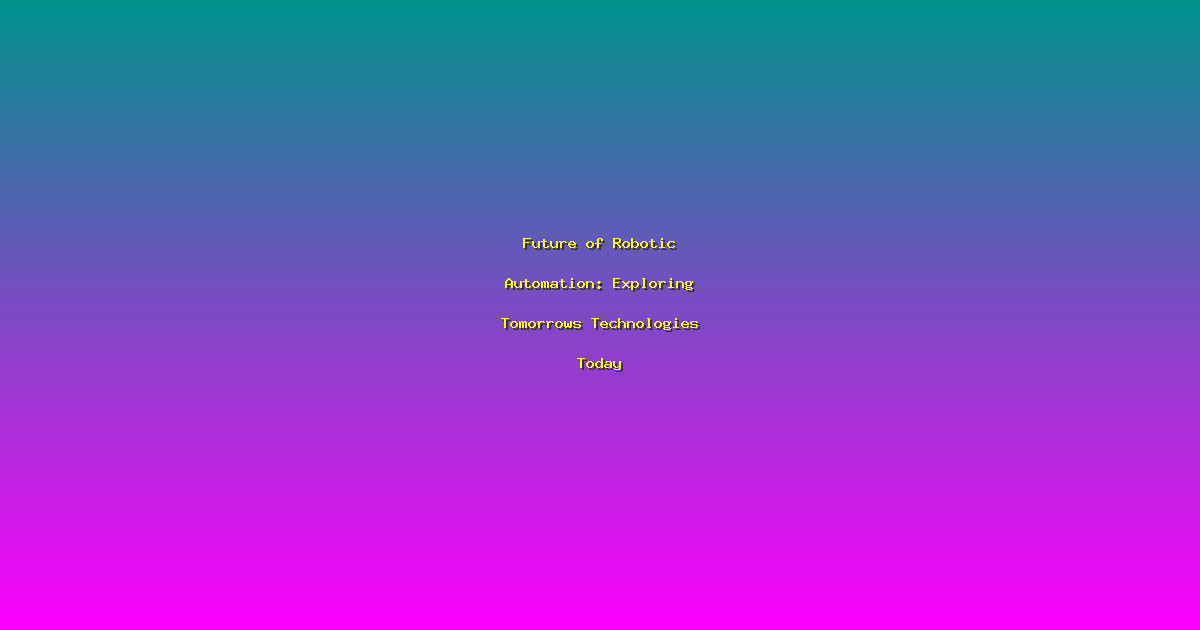Future of Robotic Automation: Exploring Tomorrow's Technologies Today
As we stand on the cusp of a new technological age, the future of robotic automation promises an era where machines and humans will work in tandem more closely than ever before. The rapid advancements in artificial intelligence, sensor technology, and robotics are not only enhancing the capabilities of robots but are also making them more accessible and adaptable. This article will delve into the exciting possibilities of tomorrow's robotic automation, exploring how these innovations could transform industries and everyday life.
The Evolution of Robotic Automation
Once confined to the manufacturing sector, robotic automation is now pervasive across various industries, from healthcare to agriculture and beyond. The journey towards more sophisticated and versatile robots has been driven by the integration of cutting-edge technologies such as machine learning, advanced sensors, and improved mechanical design. As we look to the future, the horizon is bright with possibilities, ranging from autonomous vehicles to robotic companions.
Advancements in AI and Machine Learning
One of the most significant factors driving the evolution of robotic automation is the integration of advanced AI and machine learning algorithms. These technologies enable robots to process and analyze complex data, allowing them to make decisions based on real-time information. This capability is crucial for robots that need to operate in dynamic environments, such as self-driving cars, which must navigate through unpredictable traffic conditions.
Sensor Technologies and Their Impact
Another critical development in the field of robotic automation is the advancement in sensor technologies. Modern robots are equipped with a variety of sensors, from vision systems to tactile sensors, which allow them to interact with their environment more effectively. These sensors provide robots with the sensory capabilities needed to perform delicate tasks, such as handling fragile objects or performing precise surgeries.
The Future of Robotic Interaction
As technology continues to evolve, the future of robotic interaction will see robots becoming more intuitive and capable of understanding human emotions and intentions. This will lead to more natural human-robot collaborations, making robots more integrated into our daily lives. For instance, robots could assist in elderly care, providing companionship and support, and helping to monitor health and safety.
FAQs
What are the key technologies driving the future of robotic automation?
The key technologies include advanced AI and machine learning, sensor technologies, and improvements in mechanical design and energy efficiency.
How will robotic automation impact the job market?
While robotic automation may reduce the need for humans in some manual and repetitive tasks, it also creates new job opportunities in the areas of robotics engineering, maintenance, and programming.
What are the ethical considerations in the development of robotic automation?
Ethical considerations include privacy concerns, the impact on employment, and the moral implications of robots performing tasks such as caregiving or warfare.
How close are we to having autonomous robots in our daily lives?
Autonomous robots are already present in some aspects of our lives, such as in the form of drones, self-driving cars, and home assistants. However, the integration of these robots into more complex tasks is an ongoing process.
What are the potential impacts of robotic automation on the environment?
Robotic automation has the potential to reduce environmental impact by improving efficiency and reducing waste in manufacturing and other industries, but it also raises concerns about energy consumption and electronic waste.
How can society prepare for the integration of more advanced robots?
Society can prepare by investing in education and training to equip individuals with the skills needed to work alongside robots, implementing ethical guidelines, and fostering public dialogue about the integration of advanced robotics.
Conclusion and Call to Action
The future of robotic automation is promising, with robots becoming more integrated into our daily lives and transforming industries in profound ways. To fully realize this potential, it is crucial that we continue to invest in research and development, foster collaboration between different sectors, and ensure that the integration of these advanced technologies is done ethically and responsibly. By doing so, we can harness the power of robotic automation to create a more efficient, safer, and more connected world.
Join us in exploring these exciting developments and stay informed as we continue to navigate the future of robotic automation. Visit our website for more insights and updates on the latest technologies shaping our world.

